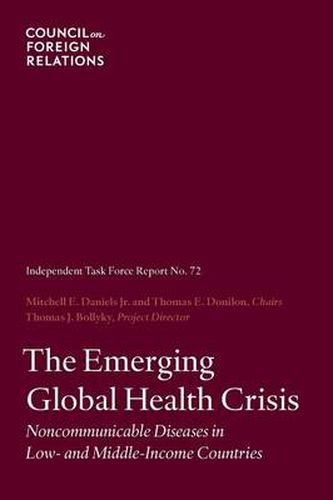Readings Newsletter
Become a Readings Member to make your shopping experience even easier.
Sign in or sign up for free!
You’re not far away from qualifying for FREE standard shipping within Australia
You’ve qualified for FREE standard shipping within Australia
The cart is loading…






Rates of heart disease, cancer, diabetes, and other noncommunicable diseases (NCDs) in low- and middle-income countries are increasing faster, in younger people, and with worse outcomes than in wealthier countries. In 2013 alone, NCDs killed eight million people before their sixtieth birthdays in developing countries. A new CFR-sponsored Independent Task Force report and accompanying interactive look at the factors behind this epidemic and the ways the United States can best fight it. The co-chairs of the Task Force are Mitchell E. Daniels Jr., Purdue University president, former Indiana governor, and former Office of Management and Budget director, and Thomas E. Donilon, distinguished fellow at CFR and former national security advisor to President Barack Obama. Thomas J. Bollyky, CFR senior fellow for global health, economics, and development, directed the project. The bipartisan Task Force, CFR’s first devoted to a global health issue, is composed of a distinguished group of experts that includes former government officials, scholars, and others. NCDs will affect U.S. interests because of their human, economic, and strategic consequences. More patients will get sick, suffer longer, require more medical care, and die young. Given the scale of these trends, the results will reverberate, the Task Force warns. It is projected that the NCD epidemic will inflict $21.3 trillion in losses in developing countries over the next two decades-a cost nearly equal to the entire economic output of those countries in 2013. These economic consequences will undercut potential U.S. trade partners and allies and may reduce domestic support for governments of U.S. strategic interest. The Task Force says the United States and like-minded partners can help developing countries meet the NCD challenge at relatively modest cost and slow the rise of this epidemic, lessen its worst effects, and help provide national governments with the time and technical assistance needed to tackle this emerging crisis sustainably on their own. The U.S. government should take two immediate steps, the Task Force says: examine its global health priorities and spending and ensure their continued effectiveness; and convene governments and other potential partners from around the world to develop a plan for collective action on NCDs in low- and middle-income countries. The Task Force encourages the United States to focus on the NCDs and risk factors most prevalent among the working-age poor in developing countries. Low-cost interventions are available and should be integrated into existing U.S. global health efforts.
$9.00 standard shipping within Australia
FREE standard shipping within Australia for orders over $100.00
Express & International shipping calculated at checkout
Rates of heart disease, cancer, diabetes, and other noncommunicable diseases (NCDs) in low- and middle-income countries are increasing faster, in younger people, and with worse outcomes than in wealthier countries. In 2013 alone, NCDs killed eight million people before their sixtieth birthdays in developing countries. A new CFR-sponsored Independent Task Force report and accompanying interactive look at the factors behind this epidemic and the ways the United States can best fight it. The co-chairs of the Task Force are Mitchell E. Daniels Jr., Purdue University president, former Indiana governor, and former Office of Management and Budget director, and Thomas E. Donilon, distinguished fellow at CFR and former national security advisor to President Barack Obama. Thomas J. Bollyky, CFR senior fellow for global health, economics, and development, directed the project. The bipartisan Task Force, CFR’s first devoted to a global health issue, is composed of a distinguished group of experts that includes former government officials, scholars, and others. NCDs will affect U.S. interests because of their human, economic, and strategic consequences. More patients will get sick, suffer longer, require more medical care, and die young. Given the scale of these trends, the results will reverberate, the Task Force warns. It is projected that the NCD epidemic will inflict $21.3 trillion in losses in developing countries over the next two decades-a cost nearly equal to the entire economic output of those countries in 2013. These economic consequences will undercut potential U.S. trade partners and allies and may reduce domestic support for governments of U.S. strategic interest. The Task Force says the United States and like-minded partners can help developing countries meet the NCD challenge at relatively modest cost and slow the rise of this epidemic, lessen its worst effects, and help provide national governments with the time and technical assistance needed to tackle this emerging crisis sustainably on their own. The U.S. government should take two immediate steps, the Task Force says: examine its global health priorities and spending and ensure their continued effectiveness; and convene governments and other potential partners from around the world to develop a plan for collective action on NCDs in low- and middle-income countries. The Task Force encourages the United States to focus on the NCDs and risk factors most prevalent among the working-age poor in developing countries. Low-cost interventions are available and should be integrated into existing U.S. global health efforts.